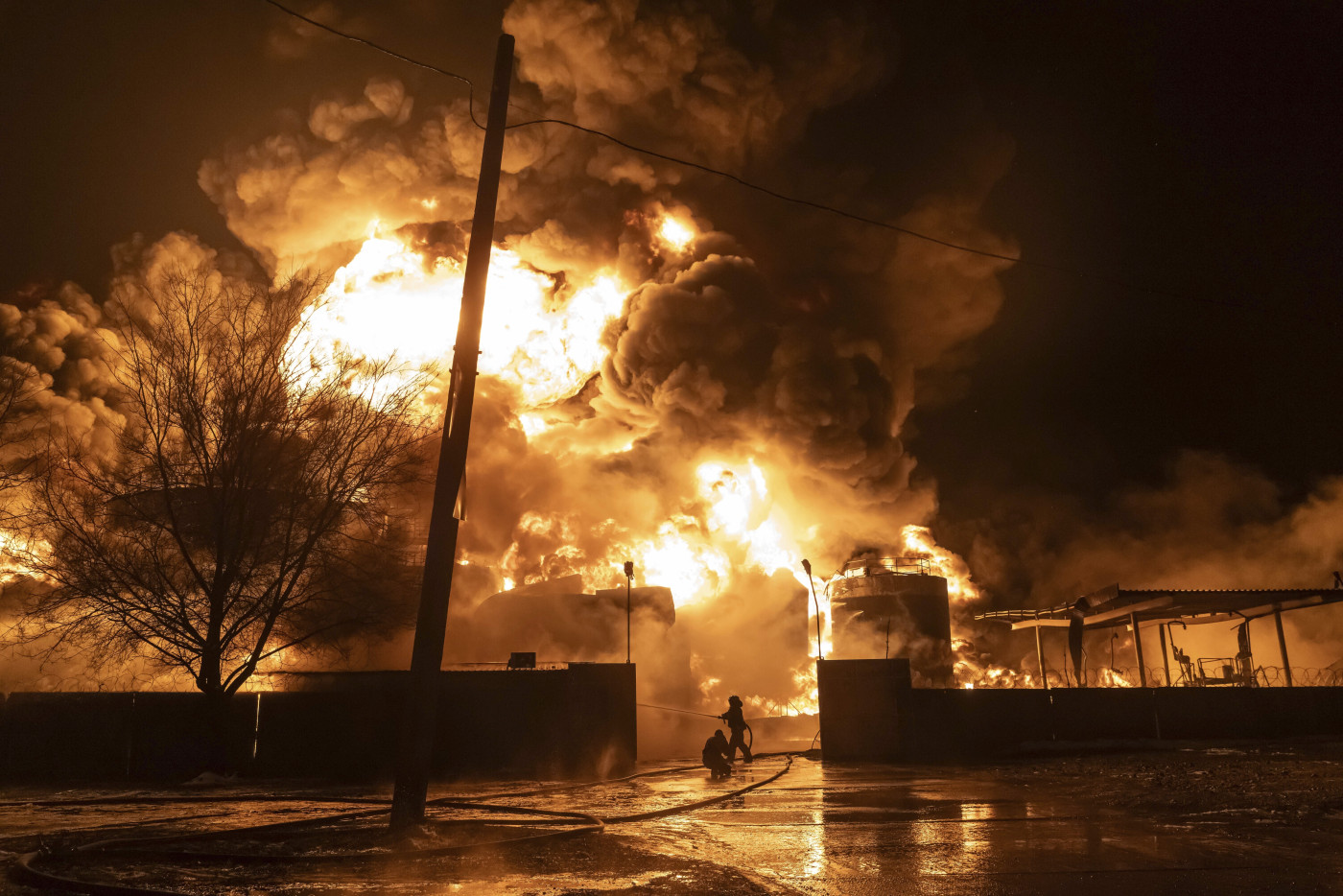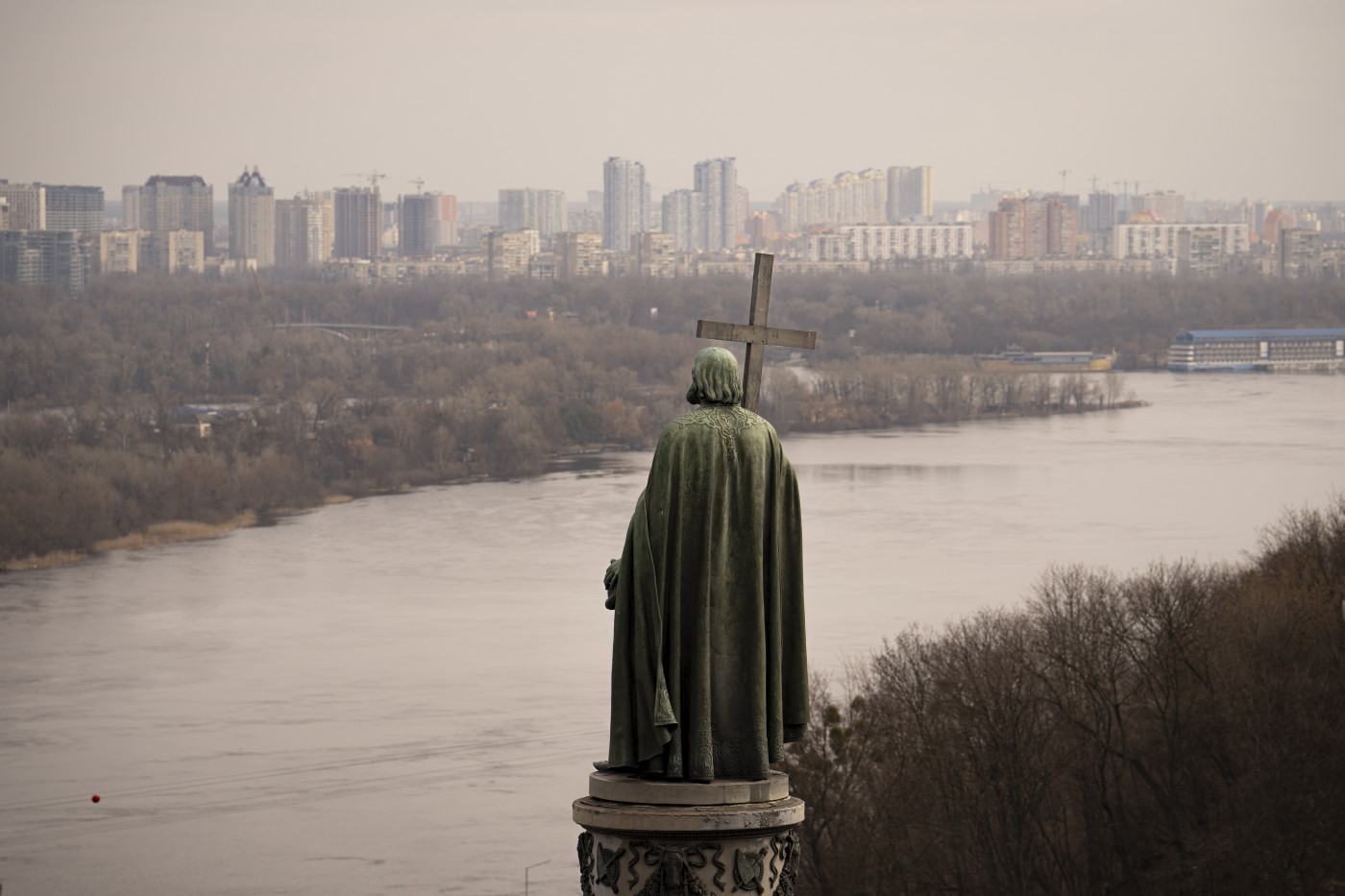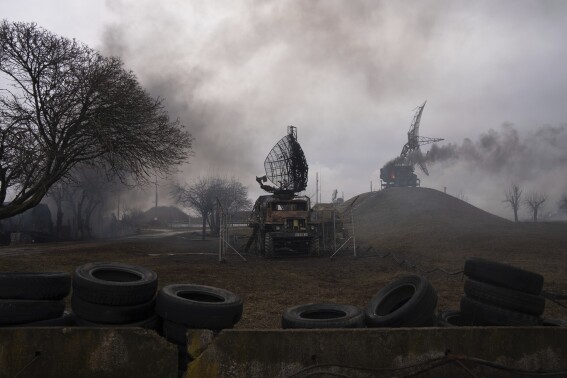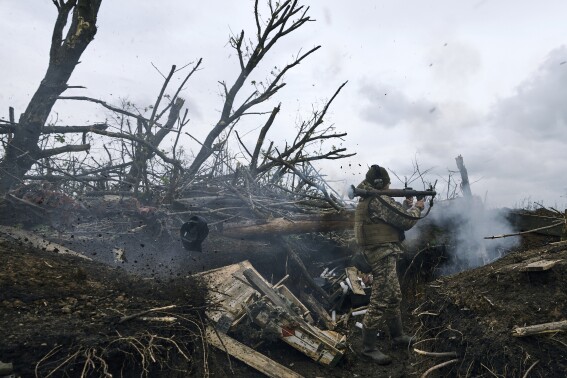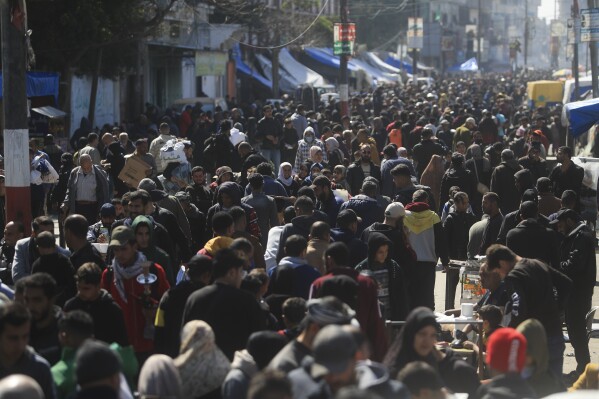Russia's Top 5 Blunders in Two Years of Ukraine War
The third year of Russia's full-scale invasion of Ukraine will begin with a largely static 900-mile front line. Russian and Ukrainian forces have taken turns attempting to smash through the fortified contact line but with limited success.
For Russia, the battlefield situation is a testament to systemic failure.
Pavel Luzin, a Russian military analyst and visiting scholar at the Fletcher School of Law and Diplomacy, told Newsweek that the Kremlin's gambit was fatally flawed from the beginning. "The biggest mistake was to start this war," he said.
"Russia could not win this war at all," he continued. "No chances. Nothing to fix... Everything is wrong: Russia's strategy, Russia's ideology, decision-making process, education system, etcetera."
Moscow's war effort has become more costly, more brutal and less ambitious over the past two years. The Kremlin's plodding devastation doctrine is still laying waste to front-line areas, but a goal of total victory was abandoned—like so many Russian soldiers—in the churned approaches to Kyiv in the spring of 2022.
"There have been incremental achievements, if you will, at an incredible cost," David Petraeus, a former CIA director and four-star general who led coalition forces in Iraq and Afghanistan, told Newsweek during a recent event organized by the Victor Pinchuk Foundation on the sidelines of the recent Munich Security Conference.
"Russia's army was unable to win anyway," Luzin said. "Russia put itself into fatal strategic disaster since February 2022."
Newsweek has contacted the Russian Defense Ministry by email to request comment.
The Kyiv Convoy
Russia's "thunder run" on Ukraine's capital—intended to be supported by the seizure of the Hostomel Airport in Kyiv's suburbs, the battle for which proved one of the most consequential of the war—ended in a costly failure.
A 40-mile convoy stretching from Belarus was the spine of the Russians' drive to seize Kyiv, but the logistical strain proved too much for Moscow's forces. The snaking column, which was gradually eroded by Ukrainian strikes, became emblematic of Russia's tactical hubris.
The Associated Press called the failure to take Kyiv "a defeat for the ages." Russian forces arrayed around the capital had come from Belarus by road and air. Moscow's lead units took up positions—and began brutalizing civilians—in suburbs like Bucha and Irpin. Reconnaissance and sabotage teams even made it into the city proper. But without resupply, taking Kyiv was not possible.
"They never really provided a resupply of any value to Russian forces that were assembling around Kyiv, never really came to their aid," then-Pentagon spokesperson John Kirby said of the stranded supply column. "The Ukrainians put a stop to that convoy pretty quickly by being very nimble, knocking out bridges, hitting lead vehicles and stopping their movement."
"This was going to be hard even if the Russian army had proven itself to be competent," Peter Mansoor, a retired Army colonel and professor of military history at Ohio State University, told the AP. "It's proven itself to be wholly incapable of conducting modern armored warfare."
Humiliation at Sea
Russia's ground, air and sea forces have all suffered humiliating losses during two years of war. While the army became bogged down and the air force failed to clear the skies of its Ukrainian enemies, Russia's fearsome Black Sea Fleet was suddenly in the firing line, despite having no conventional Ukrainian navy to actually defeat.
Initial talk of Russian amphibious landings on the southern coastline around Odesa, a Black Sea port city, came to nothing. By April, the shock sinking of the Black Sea Fleet's flagship—the guided-missile cruiser Moskva—by Ukrainian anti-ship missiles put the northern portion of the Black Sea off limits.
The sinking of the Moskva, which had a crew of 510, was the most significant naval combat loss since World War II. It was the first of many. The fleet is believed to have had around 80 vessels before Russia's 2022 invasion. Ukraine now claims to have sunk at least 25 warships of various sizes and put another 15 in for repair.
Russia's navy has been consistently outmaneuvered in the Black Sea, unable to sustain its blockade of Ukrainian ports and not even able to protect its home bases on the occupied Crimea Peninsula. Anti-ship missiles, Ukrainian-made naval drones, Western-supplied cruise missiles and commando teams have all proven capable of getting through Russian defenses.
The Moskva still stands as the most notable naval loss for Russia, although Moscow has also lost multiple Ropucha-class landing ships, the Rostov-on-Don attack submarine and the Tarantul-class Ivanovets missile corvette, another warship. Important dry dock infrastructure was destroyed in the Crimean port city of Sevastopol, while the Kerch Strait Bridge connecting Crimea and Russia was damaged by naval drones.
Even the Black Sea Fleet's headquarters buildings in Sevastopol were destroyed by a Storm Shadow cruise missile strike.
"We will be attacking Russian ships until they all follow the Moskva or they run away to the eastern part of the Black Sea and stay there," Andriy Zagorodnyuk, Ukraine's former defense minister and now an adviser to the Defense Ministry, told Newsweek last September.
'Goodwill Gestures'
The war's front-line stasis is a far cry from the fighting in 2022, when swaths of territory changed hands in weeks of fluid, mechanized combat. Russia's retreat from Kyiv in April was followed by both sides refitting before Ukraine scored major victories in the eastern Kharkiv region and the southern Kherson region.
Ukraine's southern offensive toward Kherson—and eventually as far as the banks of the Dnieper River (called the Dnipro in Ukrainian)—was long previewed. That gradual drive began in August.
But to the northeast, Ukraine masterminded a surprise offensive east of Kharkiv, pushing through relatively light Russian defenses to liberate more than 400 square miles of territory. At points, the Ukrainian attackers even outran their own supply lines, such was the speed of their advance.
This preceded success in the south, with Ukrainian troops reaching and liberating Kherson in November.
The successive Russian defeats and retreats around Kyiv in April, Kharkiv in September and Kherson in November were all described as "goodwill gestures" by the Kremlin. So too was the abandoning of Snake Island in the Black Sea in June.
The phrase became common in tongue-in-cheek comments by Ukrainians and their advocates abroad. "We have known their habit of 'goodwill gestures' for a long time," said then-Defense Minister Oleksii Reznikov in November 2022.
The same month, Ukrainian President Volodymyr Zelensky said: "The enemy does not bring us gifts, does not make 'gestures of goodwill.' We fight our way up. And when you are fighting, you must understand that every step is always resistance from the enemy, it is always the loss of the lives of our heroes."
Putin's Chef
Russia's war on Ukraine has reshaped Kremlin power dynamics and offered new avenues of influence to Vladimir Putin allies ruthless and resourceful enough to exploit them. The meteoric rise of Yevgeny Prigozhin—an influential oligarch whose catering fortune won him the nickname "Putin's chef"—is the most striking story to emerge from the Moscow psychodrama in two years of war.
Prigozhin became a warlord, using his position as the head of the Wagner Group, a mercenary organization, to gain massive influence over the Russian war effort. His forces led the grinding fight in Donetsk from 2022 through 2023, emerging in May 2023 as the victors of the fighting in Soledar and Bakhmut.
Prigozhin's fierce power struggle with Defense Minister Sergei Shoigu and military Chief of Staff Valery Gerasimov helped build a no-nonsense, man-of-the-people brand that endeared him to pro-war ultranationalists and—according to opinion polls—many Russians.
But the feud eventually proved his undoing. Last June, Wagner launched a mutiny from its base in the southwestern city of Rostov-on-Don, close to the Ukrainian border. A subsequent drive for Moscow was abandoned not far from the capital, and Prigozhin eventually agreed to a tentative deal with the Kremlin to end his rebellion.
But the deal proved merely a delay to Prigozhin's downfall. In August, the private jet he was traveling on crashed north of Moscow. U.S. intelligence suggested Prigozhin was assassinated.
The Prigozhin-Wagner drama, particularly the mutiny and the failure of Russia's security services to respond quickly and in force, was interpreted abroad as a blow to Putin's legitimacy.
"Putin's weakness and Prigozhin's brazen criticism leave the Kremlin at its weakest point in decades," the Atlantic Council said in July.
Zelensky concurred. "The fact that he killed Prigozhin—at least that's the information we all have, not any other kind—that also speaks to his rationality, and about the fact that he is weak," the Ukrainian president said in September.
'What Air Defense Doing?'
In 2022, Russia began the war with an almost free hand in Ukraine, bombing at will using a variety of cruise missiles launched by land, sea and air. Ukraine struggled through its first winter of full-scale war under a withering bombardment that almost collapsed its energy grid.
But as the conflict wore on, Kyiv honed its long-range strike capabilities and in the process revealed gaping holes in Russia's supposedly advanced air defense umbrella.
Ukraine has put significant resources into its drone program. Kyiv has touted long-range capabilities, including its UJ-26 Beaver and the UJ-22 Airborne. Ukraine is working on advanced jet-powered designs, including the UJ-25 Skyline.
The failings of Russia's anti-aircraft crews became so common that they spawned their own meme—"What air defense doing?"—which spread across social media every time there was a high-profile drone or missile attack on Russian cities, critical infrastructure or military targets. Drones even reached and exploded over the Kremlin's compound.
Russia's frontier defenses have been seen as lacking on the ground too. A significant series of incursions into the western Belgorod region by Kyiv-aligned Russian fighters in the summer of 2023 proved embarrassing for Moscow and local authorities.
The Institute for the Study of War, a U.S. think tank, said that Russian bloggers and analysts reacted with a "degree of panic, factionalism, and incoherency as [the Russian information space] tends to display when it experiences significant informational shocks." The ISW added: "The attack took Russian commentators by surprise."
Abbas Gallyamov, a political analyst and former Putin speechwriter, wrote on Telegram that the Belgorod raids "completely destroy the myth of Putin's invincible army."
He added: "They not only don't know how to advance, they're just as bad at defending."
Disclaimer: The copyright of this article belongs to the original author. Reposting this article is solely for the purpose of information dissemination and does not constitute any investment advice. If there is any infringement, please contact us immediately. We will make corrections or deletions as necessary. Thank you.
